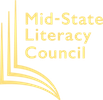As a 21-year-old born and raised in America, it’s hard to imagine that my parents, at an age not much older than me, immigrated to the United States. Growing up, English and Mandarin Chinese were both spoken, oftentimes hilariously combined to what I dub “Chinglish.” If you came into our home, you would hear questions such as “Mom, how do you say cucumber in Chinese?” or “Mabel, how do you pronounce Dartmouth?”
My identity as a first-generation Asian American led me to volunteer at Mid-State Literacy Council in fall of 2023, where I initially joined as a co-teacher for the Basic English for All class. Though I had no formal teaching training, I came with two decades of experience being raised by two English-as-a-second-language speakers and a passion to serve the immigrant community.
I remember receiving my student profiles before the first day of class. I thought to myself, how am I ever going to connect with my students? After all, I’m just an American-born college kid. Most of my students were in completely different stages of life, some with young kids, others having just arrived in America with their spouse, and almost all from completely different backgrounds than me. I was definitely a little intimidated in the beginning, but that didn’t stop me from forming connections with my students. Our communication was by no means perfect, it often included some hand signaling, lots of patience, and sprinkles of Google Translate, but the barriers never stopped us from connecting in ways we would have never imagined.
We bonded over anything and everything, from shared interests in artificial intelligence to marathon training, and I was even able to tailor my lessons according to new connections I made with students in class. I also learned that these small, shared connections opened the space for trust and participation. Soon, we were roleplaying a mother trying to talk to other parents at the playground or debating the pros and cons of ChatGPT.
I was even able to share my own identity as an encouragement for my students. First of all, I told them their English skills far surpass my Mandarin ones, and that their courage and dedication to learning a second language put my privileged bilingual upbringing to shame. I was also able to share my parents’ story of overcoming struggles in their own adventure adjusting in America.
Of course, it was still a priority to develop English language skills in our class. However, to me, it was a greater priority to nurture these unique connections I had with every single student which allowed me to take small glimpses into their lives and realize that we all actually had a lot more in common than our differences. Mid-State Literacy Council became a place where we were all united through a desire to study English together. And it also became a place where I found that my “Chinglish” upbringing could empower me to build those meaningful connections through communicating in all sorts of mashups of English and other beautiful languages.



